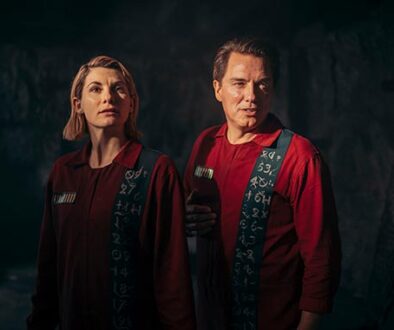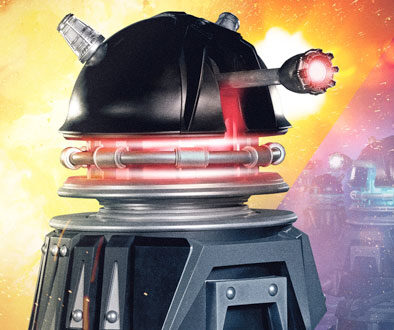“Revolution of the Daleks” Review – “Bye, fam.”
Clint Hassell gives his commentary on the 2021 New Year’s special.
Note: this review contains full SPOILERS for the episode…
Following on the controversial reveal of “The Timeless Children” – – and potentially being 2021’s only new episode of Doctor Who, due to delayed filming caused by the COVID-19 pandemic – – “Revolution of the Daleks” comes with high expectations. Not only does the New Year’s Day special serve as a sequel to Series 11’s “Arachnids in the UK,” last year’s “Resolution,” and the aforementioned Series 12 finale, the story needs to serve as a fitting exit for two companions, warrant the return of fan-favorite Jack Harkness, while also not under-utilizing the iconic Daleks. And, after the dumpster fire that was 2020, it needs to not suck. Incredibly, “Revolution of the Daleks” rises to the challenge, with Chris Chibnall’s deft script recalling some of Russell T. Davies’ grand finales.
Featuring a damning portrayal of back-room political dealings that demonstrates how bad things happen when governments are complicit, “Revolution of the Daleks” would be the most inciteful commentary on the real-world, current state of distrust in the British and American political systems – – except the episode was written and filmed prior to the botched handling of the COVID-19 pandemic. While one cannot exactly credit Chibnall for how eerily the episode mirrors 2020’s sense of cultural unrest, the uncanny timeliness of the premise is one of the episode’s greatest strengths. “Revolution of the Daleks” is so prescient, it seems to prognosticate.
The return of corrupt, American businessman Jack Robertson is also well-timed, and actor Chris Noth eschews his scenery-chewing turn in “Arachnids in the UK” for a more-restrained depiction of Robertson that only occasionally veers into overt parody of American President Donald Trump. While Robertson’s self-serving aspirations and mistrust of science perhaps veer a bit too close to reality for the normally escapist fare that is Doctor Who, as Series 11’s “Kerblam!” demonstrates, sometimes Who is at its best when its satire cuts deep, crossing into social commentary.
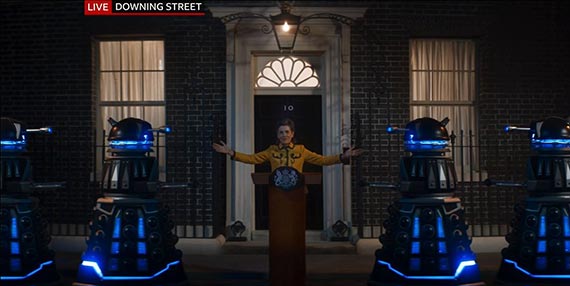
Further, “Revolution of the Daleks” benefits from its extended runtime. The guest characters, including Jo Patterson and Leo Rugazzi, are fairly developed, without detracting from the regular cast. The plot is sensible and lacks the rushed ending of Chibnall’s “The Power of Three,” another global invasion-themed episode which similarly ended two companions’ emotional arcs. While Series 12’s “Praxeus” told its story through insular, personal narratives – – making the episode feel smaller than belied by its myriad filming locations – – the scope of “Revolution of the Daleks” feels fittingly huge. Jack Harkness is not only fully integrated into the narrative, but his presence affects both the tone and themes of the story. Yes, Graham has little to do, but his character arc ended in Series 11’s “It Takes You Away,” so that’s acceptable. Too many Chibnall-era episodes have struggled, trying to divide screen time and development equally, rather than letting its individual characters feature in turn. The additional 25 minutes afforded to “Revolution of the Daleks” allows Thirteen to confront her legacy as “the Oncoming Storm” in a way unseen since Matt Smith’s tenure as the Eleventh Doctor.
Chris Chibnall effectively incorporates mythology from previous series to expand the scope of the narrative. This episode’s take on the concept of the Doctor’s two hearts – – “one happy, one sad” – – is novel, as is the use of the “suburban house” TARDIS and its functioning chameleon circuit. Sure, Chibnall remembering that a vortex manipulator is a particularly nasty way to travel through time and space is a minor delight, and Gwen Cooper gets a slight revisit (and a son!), but Jack’s reference to Rose Tyler being “trapped in a parallel universe” is not mere fan service – – it alarms Yaz, demonstrating her fear of abandonment.
In fact, Jack is particularly well-utilized in this episode. At first, his getting the Doctor out of jail – – in the episode’s first act and via Who’s signature fantasy technology, no less – – seems to falter on the promise of Jack’s reappearance from “Fugitive of the Judoon,” and his immortality doesn’t even feature; however, “Revolution of the Daleks” gives Jack the opportunity to confront his death at the hands of the Daleks in a way “The Stolen Earth”/“Journey’s End” did not, tying up a lingering plot point from Series 1’s “The Parting of the Ways.” Further, Jack’s unintentional abandonment in that episode allows him the unique opportunity to counsel Yaz on how a companion’s life is forever affected by the wonders they encounter aboard the TARDIS. Doctor Who hasn’t grappled with the concept of post-TARDIS life, since Amy and Rory debated the decision in Series 7, and hasn’t seen a companion’s extended struggle to return to the Doctor’s company, since Donna in the Series 4 premiere. Yaz’ notion that “it felt cruel, to be shown something I couldn’t have anymore,” and Jack’s return advice to “enjoy the journey, while you’re on it, ‘cause the joy is worth the pain,” hasn’t been so succinctly stated since both thoughts were echoed by former companion Sarah Jane Smith in Series 2’s “School Reunion.”
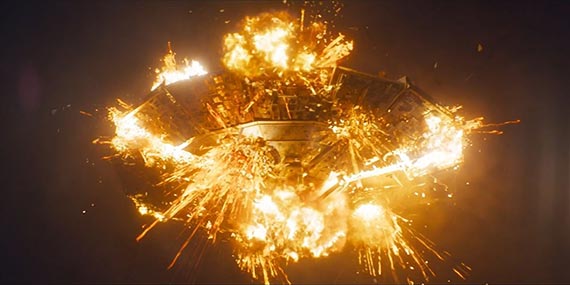
Speaking of Yasmin, it is wonderful to finally see her featured at the forefront of the group of companions, even if only in preparation for Series 13. Episodes that ostensibly should be geared towards her (including “Demons of the Punjab” and “Can You Hear Me?”) delegate screen time equally among several characters. Yes, of the current companions, her character has been the most consistently written: she’s the standard female companion who is capable and desires to see more of the world than her current situation allows (think Rose, Martha, Amy, Clara, and Bill). Because screen time does not need to be devoted to detailing Yaz’s motivations, the scriptwriters are able to pair her with the Doctor in a more effective way. Further, because the character development of Graham and Ryan has been tied directly to the plot – – and thus requires less examination – – the prototypical nature of Yasmin’s character has allowed for Doctor Who to feature three simultaneous companions, an experiment which has not been entirely successful, but which reconceived the Doctor-companion relationship into a familial one, which is paid off nicely in “Revolution of the Daleks.”
While referencing Yasmin’s experience as a police officer, as she investigates the inner-workings of the secondary TARDIS and the mystery of Robertson’s Dalek-shaped drones, “Revolution of the Daleks” expands on Yaz’s character. Note how she has taken on the Doctor-y quality of being noncommittally threatening, as she confronts Robertson, or how she is reduced to begging the cosmos to “Please . . . please be her,” as she hears the sound of the TARDIS landing. Actress Mandip Gill is stunning, as Yasmin – – confronted with the face of her abandoner and unprepared for the intensity of her feelings – – shoves the Doctor. Certainly, one of the biggest opportunities of Series 13 is the chance to write to Gill’s talent level, and “Revolution of the Daleks” demonstrates that she has fantastic chemistry with older, male entertainers-turned-actors, boding well for John Bishop as Dan.
Hopefully, Series 13 will follow on “Revolution of the Daleks” and bring an answer to what lies in the GCHQ’s “Depository 23,” an idea of Robertson’s political future – – perhaps a pairing with another iconic villain would be master-ful? – – and, as the Doctor follows her past and confronts her future, a return of Jo Martin as the Fugitive Doctor. What it won’t bring is a continued sense of “family” to Doctor Who. Thus far, Chibnall’s era hasn’t been about the Doctor and her three friends, but about Thirteen, Yaz, Ryan, and Graham struggling to rediscover their identities, bolstered by the safety of their chosen family. Fittingly, “Revolution of the Daleks” starts with the Doctor referring to her “mates,” but ends with a reference to her “fam,” making the Thirteenth Doctor feel more human than the Eighth Doctor ever claimed to be.
Random musings:
Is there anything “bad” about the episode? Not really, actually. Sure, while the pre-COVID world of 2019 feels “a long time ago,” and “far, far away,” the opening intertitle parodying Star Wars feels out of place. (Also, that orange font is particularly ugly.) The image of a prisoner marking their time of incarceration as a series of hashmarks on a wall is cliché, and the Harry Potter joke lands differently in 2021, than when it was written, due to the controversy regarding the book’s author. Jack’s off-screen exit feels rushed, but that was necessary to not overshadow Ryan and Graham’s lovely epilogue. (Honestly, after the Moffat era, it is nice to see a companion leave the series without being consumed by Weeping Angels, having their soul pecked out by a time raven, or converted into a Cyberman.)
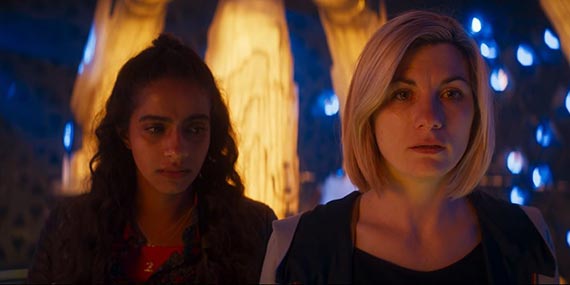
Actually, I do have one minor complaint. Thirteen makes a really big deal about how she admired Ryan’s yellow beanie, for the sole purpose of preparing the audience to appreciate the circularity of Ryan and Graham’s adventures beginning and ending (and starting again) on a hill, as Ryan learns to ride a bike. Was this heavy-handedness necessary? Surely, Ryan and Graham’s opening scene is iconic enough to be memorable without the beanie reference.
That being said, I can remember extended, relationship-defining conversations between every permutation of our main characters EXCEPT the Doctor and Ryan. I’m sure it has happened – – I just don’t recall any off the top of my head – – and that’s telling. I’m so glad that this was rectified, before Tosin Cole’s exit.
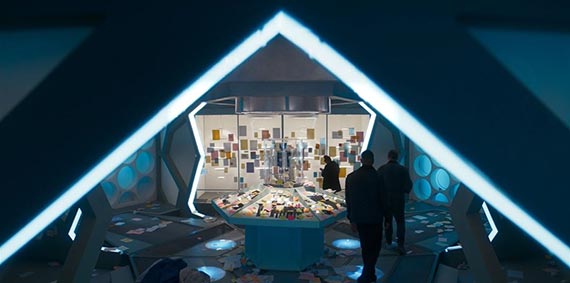
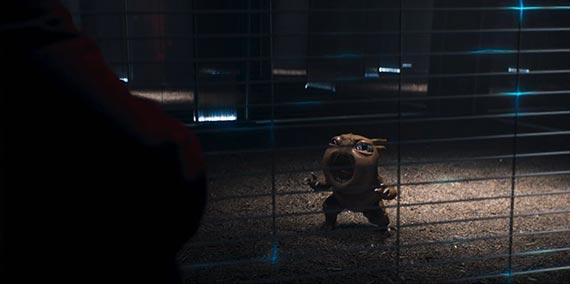
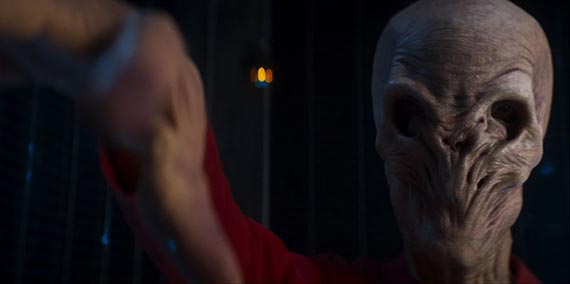





(Time) Capsule Review
“Revolution of the Daleks” does a deft job of side-stepping the controversial reveal of “The Timeless Children” in order to better balance three well-developed guest characters, a plot worthy of the iconic Daleks, the return of fan-favorite Jack Harkness, and the exit of actors Bradley Walsh and Tosin Cole from the series. Bolstered by a longer runtime and Chibnall’s best Who script to date, the story features a pivotal scene between a matured Ryan and a shaken Doctor and pushes Yaz to the forefront of the narrative, as it prepares for Series 13.







